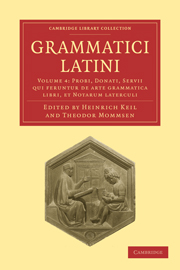Book contents
- Frontmatter
- PRAEFATIO
- PROBI CATHOLICA
- PROBI INSTITVTA ARTIVM
- PROBI INSTITVTA ARTIVM
- APPENDIX PROBI
- VALERII PROBI DE NOMINE EXCERPTA
- [PROBI] DE VLTIMIS SYLLABIS LIBER AD CAELESTINVM
- NOTARVM LATERCVLI
- DONATI ARS GRAMMATICA
- MARII SERVII HONORATI COMMENTARIVS IN ARTEM DONATI DE FINALIBVS AD AQVILINVM DE CENTVM METRIS DE METRIS HORATII
- SERGII DE LITTERA DE SYLLABA DE PEDIBVS DE ACCENTIBVS DE DISTINCTIONE COMMENTARIVS EXPLANATIONES ARTIS DONATI
- INDEX SCRIPTORVM
- INDEX RERVM ET VERBORVM
- Additio Theodori Mommseni ad p. 277—281
- CORRIGENDA ET ADDENDA
- INDEX LIBRORVM QVI HOC VOLVMINE CONTINENTVR
PROBI INSTITVTA ARTIVM
Published online by Cambridge University Press: 10 November 2010
- Frontmatter
- PRAEFATIO
- PROBI CATHOLICA
- PROBI INSTITVTA ARTIVM
- PROBI INSTITVTA ARTIVM
- APPENDIX PROBI
- VALERII PROBI DE NOMINE EXCERPTA
- [PROBI] DE VLTIMIS SYLLABIS LIBER AD CAELESTINVM
- NOTARVM LATERCVLI
- DONATI ARS GRAMMATICA
- MARII SERVII HONORATI COMMENTARIVS IN ARTEM DONATI DE FINALIBVS AD AQVILINVM DE CENTVM METRIS DE METRIS HORATII
- SERGII DE LITTERA DE SYLLABA DE PEDIBVS DE ACCENTIBVS DE DISTINCTIONE COMMENTARIVS EXPLANATIONES ARTIS DONATI
- INDEX SCRIPTORVM
- INDEX RERVM ET VERBORVM
- Additio Theodori Mommseni ad p. 277—281
- CORRIGENDA ET ADDENDA
- INDEX LIBRORVM QVI HOC VOLVMINE CONTINENTVR
Summary
DE VOCE.
Vox sive sonus est aer ictus. id est percussus, sensibilis auditu, quantum in ipso est, hoc est quam diu resonat. nunc omnis vox sive sonus aut articulata est aut confusa. articulata est, qua homines locuntur et litteris conprehendi potest, ut puta ‘scribe Cicero’, ‘Vergili lege’ et cetera talia. confusa vero aut animalium aut inanimalium est, quae litteris conprehendi non potest. auimalium est ut puta equorum hinnitus, rabies canum, rugitus ferarum, serpentum sibilus, avium cantus et cetera talia; inanimalium autem est ut puta cymbalorum tinnitus, flagellorum strepitus, undarum pulsus, ruinae casus, fistulae auditus et cetera talia. est et confusa vox sive sonus hominum, quae litteris conprehendi non potest, ut puta oris risus vel sibilatus, pectoris mugitus et cetera talia. de voce sive sono, quantum ratio poscebat, tractavimus.
DE ARTE.
Ars est unius cuiusque rei scientia summa subtilitate adprehensa. nam et Graeci ἀπὸ τῆς ἀϱετης, a virtute, censebant artem esse dicendam. unde et veteres artem pro virtute frequenter usurpant. nunc huius artis, id est grammaticae, omnis dumtaxat Latinitas ex duabus partibus constat, hoc est ex analogia et anomalia, et ideo utriusque partis rationem subicimus.
DE ANALOGIA.
Analogia est ratio recta perseverans per integram declinationis disciplinam. ut puta hic Catilina, haec lupa, hoc scri|nium et cetera talia; scilicet quoniam haec nomina sic per ∥ omnes casus secundum sua genera in declinatione perseverant, sic uti est analogiae recta declinationis disciplina.
- Type
- Chapter
- Information
- Grammatici Latini , pp. 47 - 192Publisher: Cambridge University PressPrint publication year: 2009First published in: 1864



